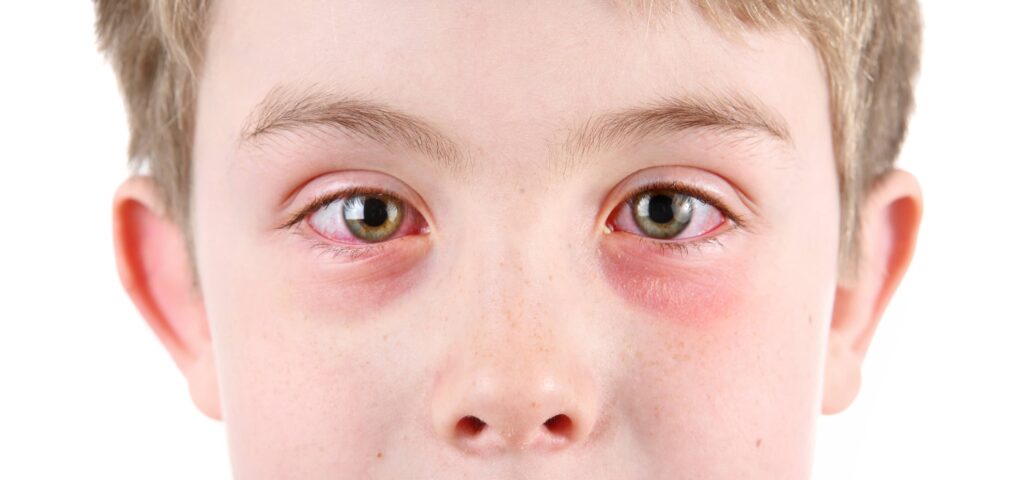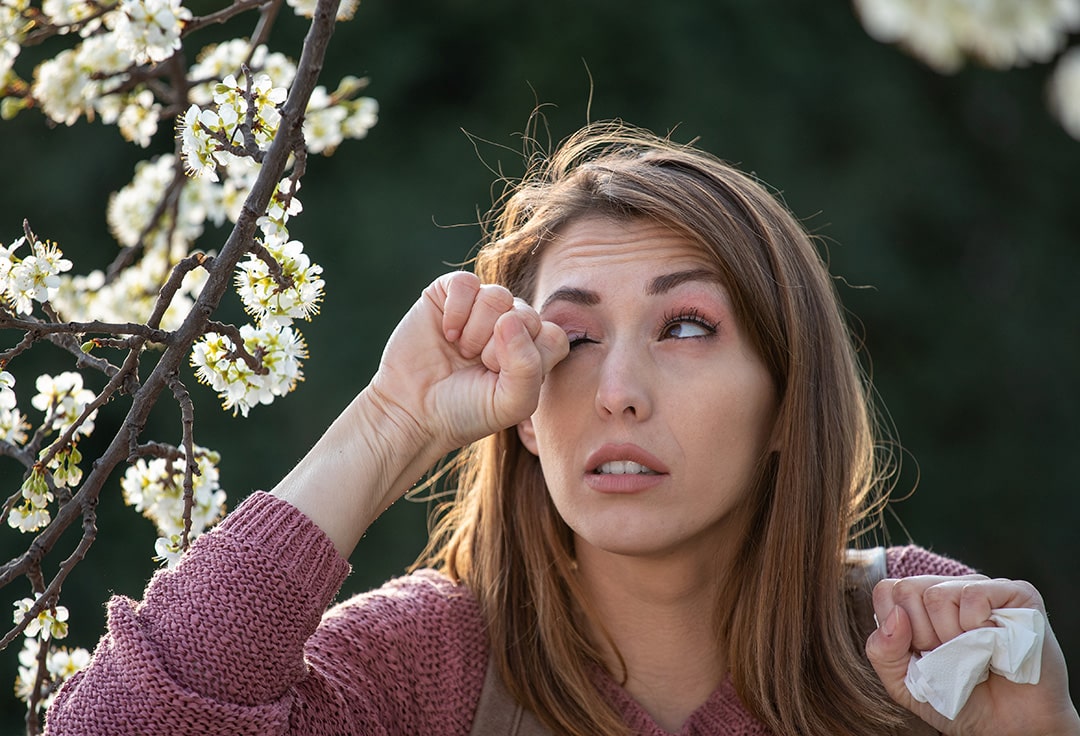Are you suffering from itchy eyes, contact lens discomfort, and a feeling of sand in your eyes? If so, you may be experiencing the effects of allergies on your eye health. Dry eyes caused by allergies are a common eye condition that can be uncomfortable and even lead to vision problems if left untreated. In this article, we’ll discuss five ways allergies can cause dry eyes and how to manage seasonal allergy symptoms to protect your eye health.
From understanding the connection between contact lenses and allergies to recognizing the signs of dry eye symptoms, this guide will help you keep your eyes healthy all year round.
The Link between Allergies and Dry Eyes
Allergies can be a common cause of dry eyes, which is a condition that occurs when the eyes don’t produce enough tears to keep them lubricated. Dry eye disease is a health condition that affects millions of people and can lead to uncomfortable symptoms such as itchy eyes, refractive lens discomfort, and blurry vision.
Dry Eyes Caused by Pollen and Other Outdoor Allergens
The connection between allergies and dry eyes is due to environmental factors such as pollen, dust mites, pet dander, and smoke which can trigger an allergic reaction in some people. This reaction causes inflammation in the eye area which can reduce tear production and lead to dry eye symptoms.
In addition to environmental factors, certain medications such as antihistamines or decongestants may also contribute to dry eye symptoms by reducing tear production. It’s important for those with allergies to be aware of the potential side effects of their medications so they can take steps to protect their vision from dry eye disease. For example, using artificial tears or lubricating drops throughout the day can help keep the eyes moist and reduce irritation caused by allergens. Additionally, wearing sunglasses outdoors may help reduce exposure to allergens that could trigger an allergic reaction in some individuals.
Signs and Symptoms of Allergy-Related Dry Eyes
Eye allergy symptoms can be uncomfortable and even lead to vision problems if left untreated. Symptoms of allergy-related dry eyes include:
- Itchy, red eyes
- Puffy eyes, also known as allergic shiners
- Burning sensation in the eyes
- Blurred vision
- Sensitivity to light
- Excessive tearing or watery eyes
- Contact lens discomfort
- A feeling of sand or grit in the eyes
- Discharge from the eyes
How Allergies Can Cause Dry Eyes?
Risk factors for developing dry eye syndrome caused by allergies include:
1. Allergens such as pollen, dust mites, pet dander, and smoke can trigger an allergic reaction in some people which causes inflammation in the eye area and reduces tear production.
2. Certain medications such as antihistamines or decongestants may also contribute to dry eye symptoms by reducing tear production.
3. Allergies can also cause inflammation of the meibomian glands which are responsible for producing oil that helps keep tears from evaporating too quickly, leading to dry eyes.
4. Allergic reactions can cause the eyes to produce excess tears which evaporate quickly, leaving behind a feeling of dryness and irritation.
5. Prolonged exposure to allergens can cause inflammation of the conjunctiva, a thin membrane that covers the white part of the eye, resulting in dryness and discomfort.

Treatments for Dry Eyes Caused by Allergies
Treatments for dry eyes caused by allergies can vary depending on the severity of the condition. The first step in treating dry eyes is to get an accurate diagnosis from an eye doctor. During a comprehensive eye exam, your eye doctor will assess your tear volume and look for signs of concurrent allergy or allergic conjunctivitis. Common symptoms that may be present include redness, itching, burning, and excessive tearing.
Once a diagnosis has been made, your eye doctor may recommend allergy drops or other medications to reduce inflammation and improve tear production. In some cases, artificial tears may also be prescribed to help lubricate the eyes and provide relief from dryness and discomfort. Additionally, lifestyle changes such as avoiding allergens or wearing sunglasses outdoors can help reduce exposure to irritants that could trigger an allergic reaction.
Finally, it’s important to maintain a healthy tear film by regularly using artificial tears throughout the day and avoiding activities that could cause further irritation such as staring at screens for long periods of time or rubbing the eyes too vigorously. With proper treatment and management, those with allergies-related dry eyes can find relief from their symptoms and protect their vision from further damage.
Tips to Minimize Dry Eye Cause By Allergies
- Wear sunglasses when outdoors to protect your eyes from light sensitivity caused by allergies.
- Wash your hands frequently and avoid touching your face to reduce the spread of allergens.
- Increase tear secretion by drinking plenty of water and eating foods rich in omega-3 fatty acids.
- Avoid environmental allergens such as pollen, pet dander, and dust mites by keeping windows closed and using air purifiers.
- Use a humidifier in dry weather conditions to help keep the air moist and prevent dry eye symptoms.
- Take ocular allergies seriously and consult with an eye doctor if you experience any symptoms.
- Use a saline nasal spray to help clear your nose of allergens and reduce runny nose.
- Talk to your doctor about taking allergy medications such as antihistamines or decongestants to reduce inflammation and improve tear production.
- Avoid air conditioning when possible as it can dry out the eyes and worsen symptoms.
- Apply cool compresses to the eyes several times a day to help soothe irritation and reduce inflammation.
- Follow a regular dry eye treatment plan prescribed by your eye doctor, which may include using artificial tears to wash allergens or taking omega-3 supplements.
Ready for a consultation?
If you are looking for treatment options and want state-of-the-art laser eye surgery to cure your dry eye disease, the Dry Eye Treatment Hawaii specialists at EyeSight Hawaii in Honolulu, HI, and Maui, HI. Make an appointment online or call our office to schedule a consultation today!

